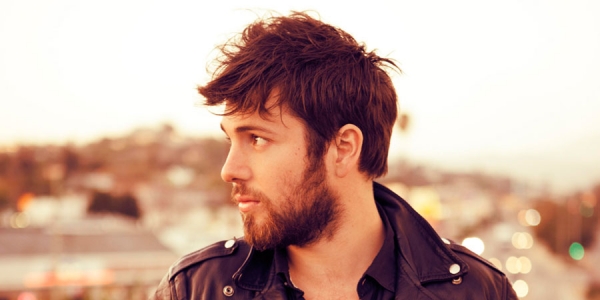“I was reading a lot of Eckhart Toll,” she says, smiling. “I love him, it made a big imprint on me. The Present, for example, there’s the chanting mantras in it. Obviously that’s quite an Indian kind of style. And the power of that is that it really starts to sink into your brain, and reprogram your thought patterns. So it had this Indian flavour and I thought ‘Oh, we need sitar!’” The chanting and the idea of truly feeling existence are both there in opening track Providence, wherein the repeated line “We’re here, we’re here, we’re here” is bolstered by many voices, among other incantations. It has a very Beatles bearing and Mitchell explains that her producer Dann Hume is a giant Beatles fan. “He’s as obsessed with The Beatles as I am with, oh, Patti Smith or Regina Spektor. Just ob-sessed, would buy anything they put out, even if it was a re-issue, or re-mastered. ‘I can hear it, it’s slightly different,’” she mimics (the absent) Hume with a laugh, and answers as herself: “’Honestly Dann, it’s the same song.’” Mitchell admits she isn’t as educated in the Beatles as she’d like to be, owing to her dad’s musical tastes which informed her earliest understanding of music. “I notice a lot of guys in their 20s are all over the Beatles,” she says, sweeping her hand to encompass the acumen of that demographic. “My dad was more like Neil Young, Dylan, Cat Stevens kind of vibe. Not as poppy, or band-y.” Despite this, she raves about the recent Scorsese documentary on George Harrison, Living In The Material World (2011). “For me, that joined the dots between that time, and spirituality, and India, and there’s George Harrison at the heart of the pop culture industry but he’s off learning how to play sitar in India. Incredible,” she says with widened eyes. Mitchell will be travelling to India for the first time in November of this year and she’s clearly totally electrified for the adventure.
The Beatles sound to Bless This Mess continues through stand-out The Raven And The Mushroom Man, which is a “little tangent” Mitchell wrote as an extension from the beloved 1943 novella by Antoine de Saint-Exupéry, The Little Prince. “Oh my gosh, isn’t it amazing? It’s just one of those books that I buy if I go into a book store. I just buy a couple more copies and have them in my bag and give them to people. It costs six bucks, and it’s a classic. It’s one of those ones you want everyone to read. It’s so fun, and the drawings are so great, and it’s so profound,” she says, and is delighted when I tell her I was given the book by a friend who had the exact same mission. Extracting characters from the tale, Mitchell decided to use its metaphor of “the rat race of society” to create her own story. To explain the part of The Little Prince which inspired her she scoots forward onto the edge of the sofa and starts to act it out, with endearing candour. “So there’s one character, you know the little mushroom man that’s typing away furiously on his little planet. And he’s really angry, and sweating, and the little prince is like, ‘’Scuse me, have you seen my sheep?’ The little man’s like, ‘Hundred and three! Hundred and four! Go away, I’m too important to deal with this!’ [The little prince says] ‘’Scuse me, like, I really need to talk to you’ and the little man [says] ‘Hundred and nine… Oh! Now you’ve fucked me up! What will I do now?’ It’s like, oh my God, what are you doing, dude? You’re on this beautiful little planet, just enjoy it. I thought, this is a great metaphor; how can I break them out of this?
“It’s human compassion: it’s that darkness of life and death that connects you back to here,” she says with a click of her fingers. “You’re like, [money] and shit doesn’t matter right now, do you know what I mean? I’m just going to help you.” To re-imagine the narrative Mitchell used her own symbols, most notably the raven which often appears in her songs as a sign of hope, despite its traditionally sombre associations. She also believes that its interpretation as a messenger has added to its value and meaning for her. “I think people are so scared of being dark,” she explains. “But that’s where your truth is. Because when you go dark, you have to really ask yourself questions [like] ‘Why am I dark? What am I not happy about? Am I okay in my life?’ You know, all these big questions that don’t confront you unless you really go [there].” After this little segue she recommences the story of the track, which ends with the death of one of its main characters. “But the last line in the song is that a rose grows from the seed of hope that’s been planted,” Mitchell smiles. She’s almost whispering, but at times she’ll burst into a loud, delighted laugh at a joke or the falderal of herself. “I’d love to make an animation for [the song],” she says, but concedes that at this stage she isn’t sure exactly which tracks will be singles. “I kind of like to see how it goes,” she says. “I kind of have ideas; I’d like maybe Providence or Walk With Me to be singles.”
The final song of the album is somewhat hidden – as hidden as is possible in this digital age, anyway. There’s a strange, constant instrument which builds like layers of cloud, and it sounds like a cello perhaps artificially sustained. Mitchell’s eyes light up and she says, “It’s a harmonium. The first time I saw one I was in a yoga class in New York, and I was like, ‘What is that. Get me one now. Can I have that?’” She stops laughing just long enough to add, “There was the most beautiful pregnant woman playing it and I was like, guh. Give me a baby and a harmonium and I’ll be happy.” She laughs sunnily again, then calms to make her point. “Isn’t it great? Just the most amazing drones,” she says.
The leading single from Bless This Mess is the titular track, with the clip’s premiere held just over a week ago. “It’s very moody, very sexy, very kind of dark, and just very different from anything I’ve done in a visual sense before,” says Mitchell. The video is true to its aural inspiration, which employs thumping toms, tambourine, vocals that are strong but tender, and a chorus of female backers singing the dominant fifth of Mitchell’s tonic. Perhaps not so incredibly, the 22-year-old isn’t familiar with romantically dusky and very ’80s icon Belinda Carlisle, whose best work the song invokes (but she writes Carlisle’s name on her index of things to investigate).
Mitchell had what she describes as a “dream list” of engineers, producers and other creatives she wanted to work with for the album but soon realised there was so much expertise in her native Melbourne which she could make use of, with producer and close friend Hume at the head of this pack. “I don’t want to nick off,” she says. “I really want to use the local talent. I mean, how cool to work with your friends?” The tour is going to be a study in this idea, with Mitchell’s supports confirmed to be Hume’s solo project Danco, as well as pop six-piece Alpine, whose record A Is For Alpine Hume also produced. “Dann, he’s great,” Mitchell says, wrinkling her nose a bit with obvious affection. “I recorded my first EP with him, and that was his first recording project, so we both kind of started our little careers off that. His solo stuff’s very messy, electric Dylan, poppy. Like pop‘n’roll, love songs, just really great. So he’s supporting, then Alpine, and then me. So it’s just going to be…” she pauses, and finishes the sentence by clasping her hands together with a mega smile and the word, “mates.”
BY ZOË RADAS







